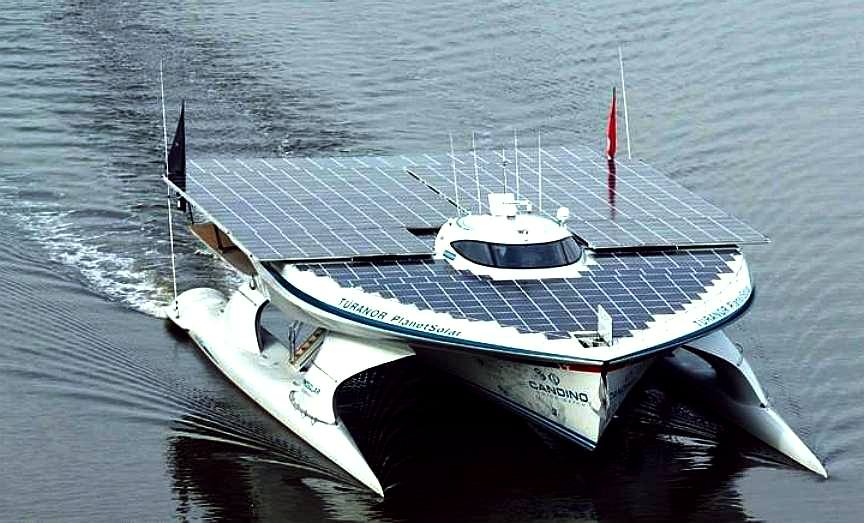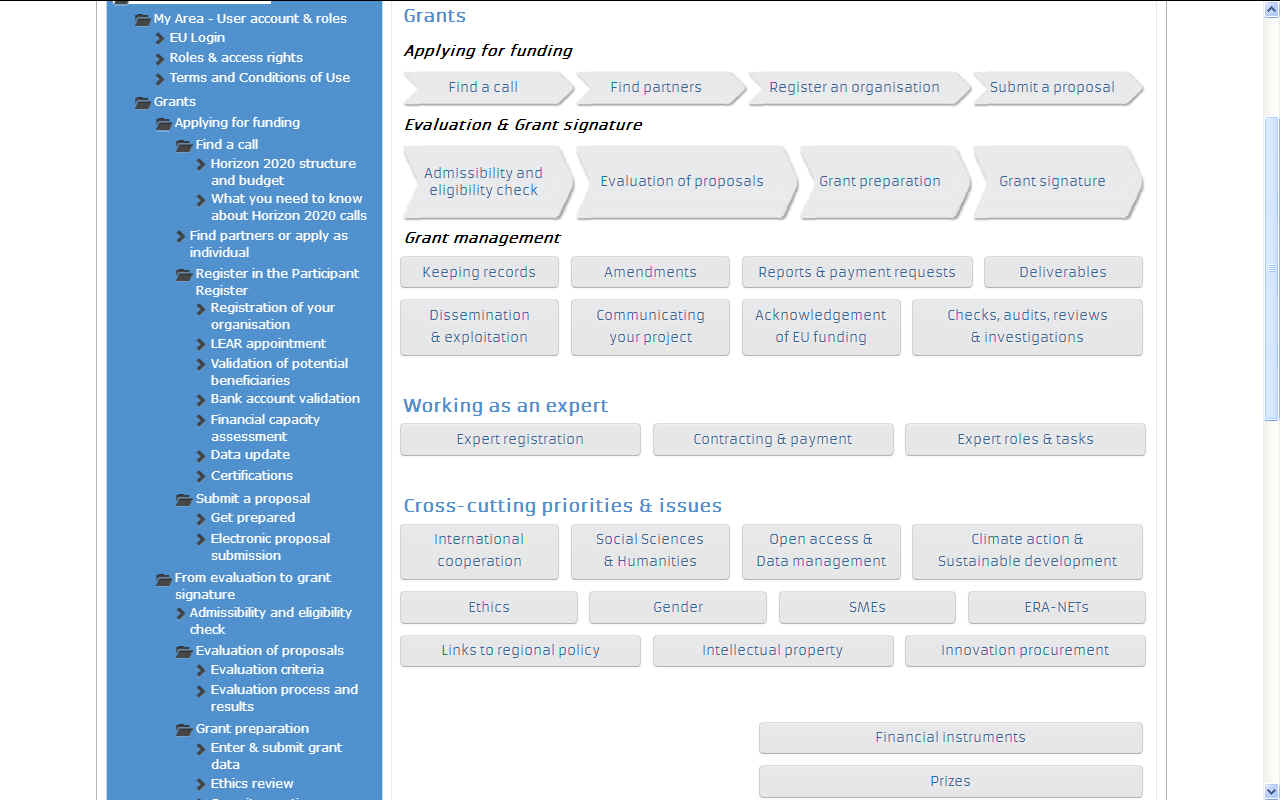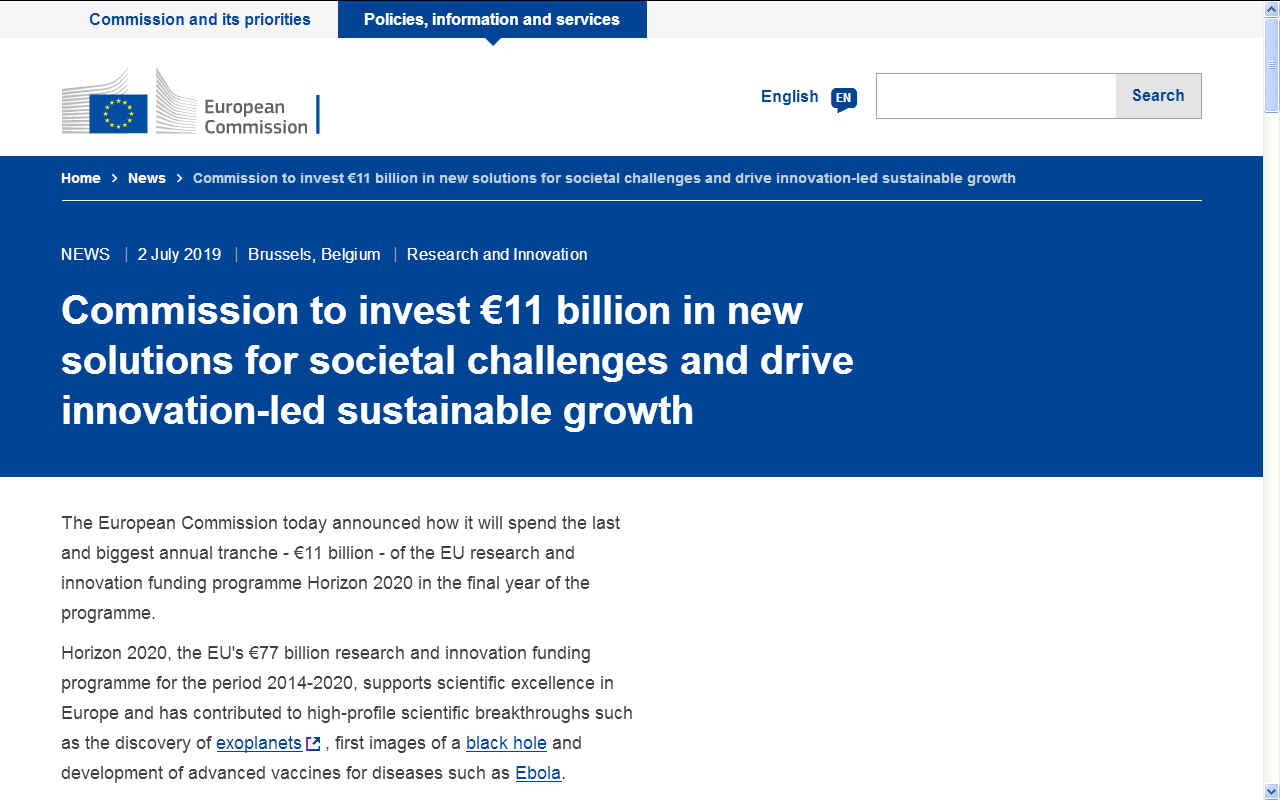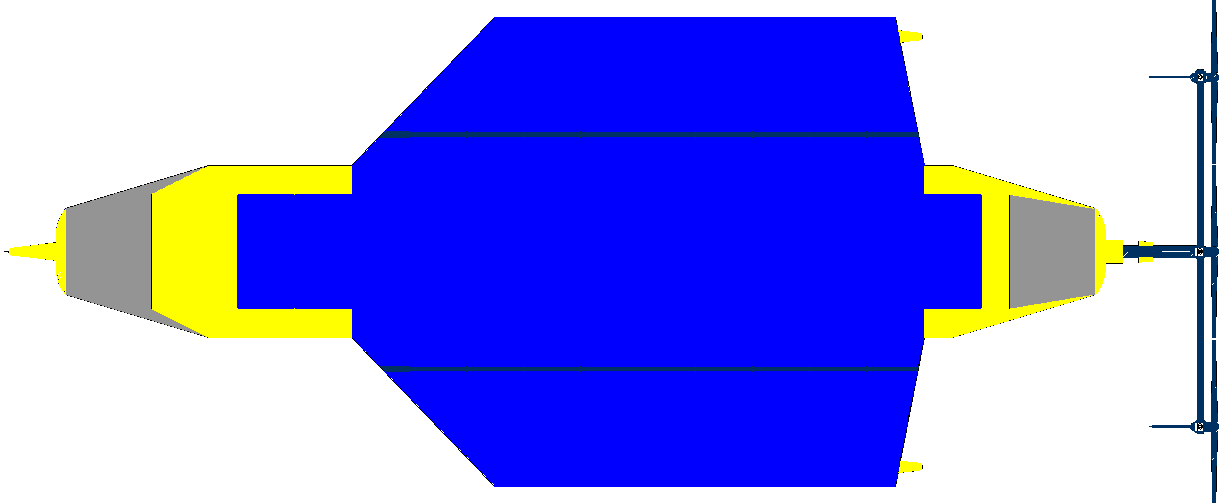|
HORIZON 2020 MANUAL FOR PARTICIPANTS
Please use our A-Z INDEX to navigate this site where page links may lead to other sites
|
|
GUINNESS BOOK OF RECORDS - The first climate friendly blue water cruiser was the MS Turanor PlanetSolar (Switzerland) which circumnavigated the world in a westward direction from Monaco in 1 year 7 months and 7 days from 27 September 2010 to 4 May 2012. Why nobody has improved on the concept since then is a source of wonder. The problem with PlanetSolar in terms of take-up was the limited speed, that operators of commercial lines would be likely to see as uncompetitive.
H2020 ONLINE MANUAL
FUNDING TENDER OPPORTUNITIES
Single Electronic Data Interchange Area (SEDIA)
Funding updates Archived funding (FP7-CIP) Search Funding Tenders HOW TO PARTICIPATE Projects Results
SUPPORT National Contact Points for Horizon 2020 The network of National Contact Points (NCPs) is the main structure to provide guidance, practical information and assistance on all aspects of participation in Horizon 2020. NCPs are also established in many non-EU and non-associated countries.
Carlos Moedas, Commissioner for Research, Science and Innovation, is quoted as saying:
Horizon 2020 is generating new knowledge and technologies, and has a strong economic impact. For every 100 euro we invest through Horizon 2020, we expect to add 850 euro to our GDP by 2030, creating millions of jobs for Europeans. That is why we have proposed €100 billion for the next Horizon Europe programme, to boost the EU's competitiveness, innovation capacities and scientific excellence.
Focusing on political priorities
This Work Programme will support the budget for 2018-2020 and the Commission’s political priorities, in the following areas:
- A low-carbon, climate resilient future: €3.7 billion - Circular economy: €1 billion - Digitising and transforming European industry and services: €1.8 billion - Security Union: €1 billion
In 2020, €206 million is earmarked for projects to transform sectors that are traditionally energy intensive into competitive, low-carbon and circular industries and to significantly lower their environmental footprint. €132 million will support the development and production in Europe of the next generation of batteries, as part of the drive towards a low-carbon, climate-resilient future. Ten new topics on plastics with a total budget of €135 million contribute in different ways to the EU Plastics Strategy. Artificial intelligence, which is at the core of today’s most promising breakthroughs, has a budget of €396 million and €116 million is earmarked for developing new capabilities for fighting and preventing cybercrime.
Boosting 'blue sky' research
At the same time, Horizon 2020 will continue to fund "curiosity-driven science" (often referred to as "blue sky science" or "frontier research"). The annual Work Programme of the European Research Council for 2020, adopted today, will enable support for excellent researchers with over €2.2 billion. Marie Skłodowska-Curie Actions, which fund fellowships for researchers at all stages of their careers, receive a boost with over €1 billion in total.
Enhancing international cooperation
This last Work Programme also strengthens international cooperation in research and innovation. It will invest over €550 million in 2020 in cooperation flagships in areas of mutual benefit. Examples include working with Africa on global health, food and nutrition security, with the US, Canada and Japan on clean energy, and with China on food production, biotech, energy, natural resources and urbanisation.
Bridging to Horizon Europe
Since the beginning of its mandate, the Juncker Commission has been working hard to give Europe's many innovative entrepreneurs every opportunity to thrive. The Commission launched the first phase of the European Innovation Council, to turn Europe's scientific discoveries into businesses that can scale up faster. The EIC Accelerator pilot announced in March will test a grant and equity blended financing model, paving the way for a fully-fledged European Innovation Council in the next EU research and innovation framework programme, Horizon Europe.
In anticipation of the expected structure and content of Horizon Europe, €209 million brings together actions on food and natural resources. Co-creating methods and approaches are being tested through cross-cutting calls on interdisciplinary challenges such as Competitive, Low Carbon and Circular Industries. To trial ways of simplifying participants’ experience, the use of Lump-sum pilots will be further expanded throughout the work programme. In addition, policy areas with increased prominence in the Horizon Europe proposal are addressed, such as smart buildings and airports, and the microbiome.
Background
Horizon 2020 is the EU's biggest ever research and innovation framework programme with a budget of €77 billion over seven years (2014-2020). While most research and innovation activities are still underway or yet to start, the programme is delivering.
In June 2018, for the budget period 2021-2027 the Commission proposed Horizon Europe, the next EU research and innovation programme with a budget of €100 billion. In March 2019 the European Parliament and the Council of the EU have reached a provisional agreement on Horizon Europe.
LINKS & REFERENCES
https://www.eea.europa.eu/data-and-maps/indicators/transport-emissions-of-greenhouse-gases/transport-emissions-of-greenhouse-gases-10 https://ec.europa.eu/info/funding-tenders/opportunities/portal/screen/opportunities/topic-details/lc-mg-1-13-2020 https://ec.europa.eu/inea/en/news-events/events/horizon-2020-transport-info-day-0
Please use our A-Z INDEX to navigate this site
|
|
|
This website is provided on a free basis as a public information service. copyright © Climate Change Trust 2019. Solar Studios, BN271RF, United Kingdom.
|



